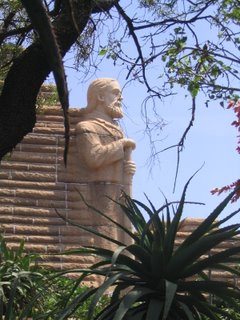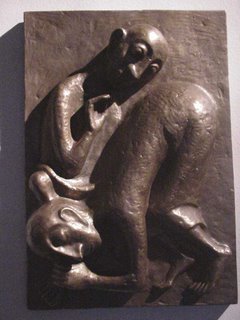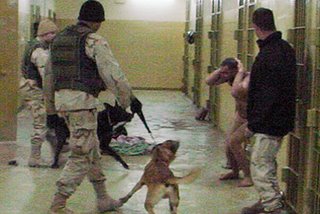Sunday, December 31, 2006
Sleeping again.
Let's see:
6 AM in Iraq is 4 AM in Amstderdam
4 AM in Amsterdam is 10 PM in Washington.
Bush was not in Washington, but in Texas.
10 PM in Washington is 9 PM in Texas.
And Bush is sleeping.
A week or so ago there was a column in the paper here about the leaders of the "good old days" who slept very little. Churchill was reported to sleep as little as possible, but he always took a nap during the day. Especially during World War II Churchill could bring himself to get to bed early at all.
And now we are in a 'war aginst terrorism', in which our freedom hangs in the balance.
And our leader is already sleeping at 9PM.
Monday, December 25, 2006
The Innkeeper
by Frederick Buechner
“That was a long, long time ago,” said the Innkeeper, “and a long, long way away. But the memories of men are also long, and nobody has forgotten anything about my own sad, queer part in it all unless maybe they have forgotten the truth about it. But you can never blame people for forgetting the truth because it is, after all, such a subtle and evasive commodity. In fact, all that distinguishes a truth from a lie may finally be no more than just the flutter of an eyelid or the tone of a voice. If I were to say, ‘I BELIEVE!’ that would be a lie, but if I were to say, ‘I believe…’ that might be the truth. So I do not blame posterity for forgetting the subtleties and making me out to be the black villain of the piece – the heartless one who said, ‘No room! No room!’ I’ll even grant you that a kind of villainy may be part of the truth. But if you want to speak the whole truth, then you will have to call me a villain with a catch in your voice, at least a tremor, a hesitation maybe, with even the glitter of almost a tear in your eye. Because nothing is entirely black, you know. Not even the human heart.
“I speak to you as mean of the world,” said the Innkeeper. “Not as idealists but as realists. Do you know what it is like to run an inn – to run a business, a family, to run anything in this world for that matter, even your own life? It is like being lost in a forest of a million trees,” said the Innkeeper, “and each tree is a thing to be done. Is there fresh linen on all the beds? Did the children put on their coats before they went out? Has the letter been written, the book read? Is there money enough left in the bank? Today we have food in our bellies and clothes on our backs, but what can we do to make sure that we will have them still tomorrow? A million trees. A million things.
“Until finally we have eyes for nothing else, and whatever we see turns into a thing. The sparrow lying in the dust at your feet – just a thing to be kicked out of the way, not the mystery of death. The calling of children outside your window – just a distraction, an irrelevance, not life, not the wildest miracle of them all. That whispering in the air that comes sudden and soft from nowhere – only the wind, the wind…
“Of course I remember very well the evening they arrived. I was working on my accounts and looked up just in time to see the woman coming through the door. She walked in that slow, heavy-footed way that women have in their last months, as though they are walking in a dream or at the bottom of the sea. Her husband stood a little behind her – a tongue-tied, helpless kind of man, I though. I cannot remember either of them saying anything, although I suppose some words must have passed. But at least it was mostly silence. The clumsy silence of the poor. You know what I mean. It was clear enough what they wanted.
“The stars had come out. I remember the stars perfectly though I don’t know why I should, sitting inside as I was. And my wife’s cat jumped up onto the table where I was sitting. I had not stood up, of course. There was mainly just silence. Then it happened much in the way you have heard. I did not lie about there being no room left – there really was none – though perhaps if there had been a room, I might have lied. As much for their sakes as for the sake of the inn. Their kind would have felt more at home in a stable, that’s all, and I do not mean that unkindly either. God knows.
“Later that night, when the baby came, I was not there,” the Innkeeper said. “I was lost in the forest somewhere, the unenchanted forest of a million trees. Fifteen steps to the cellar, and watch out for your head going down. Firewood to the left. If the fire goes out, the heart freezes. Only the wind, the wind. I speak to you as men of the world. So when the baby came, I was not around, and I saw none of it. As for what I heard – just at that moment itself of birth when nobody turns into somebody – I do not rightly know what I heard.
“But this I do know. My own true love. All your life long, you wait for your own true love to come – we all of us do – our destiny, our joy, our heart’s desire. So how am I to say it, gentlemen? When he came, I missed him.
“Pray for me, brothers and sisters. Pray for the Innkeeper. Pray for me, and for us all, my own true love."
Friday, December 22, 2006
Mideast rules to live by
For a long time, I let my hopes for a decent outcome in
Rule 1: What people tell you in private in the
Rule 2: Any reporter or U.S. Army officer wanting to serve in
Rule 3: If you can’t explain something to Middle Easterners with a conspiracy theory, then don’t try to explain it at all — they won’t believe it.
Rule 4: In the
Rule 5: Never lead your story out of
Rule 6: In the
Rule 7: The most oft-used expression by moderate Arab pols is: “We were just about to stand up to the bad guys when you stupid Americans did that stupid thing. Had you stupid Americans not done that stupid thing, we would have stood up, but now it’s too late. It’s all your fault for being so stupid.”
Rule 8: Civil wars in the Arab world are rarely about ideas — like liberalism vs. communism. They are about which tribe gets to rule. So, yes,
Rule 9: In
Rule 10: Mideast civil wars end in one of three ways: a) like the
Rule 11: The most underestimated emotion in Arab politics is humiliation. The Israeli-Arab conflict, for instance, is not just about borders.
Rule 12: Thus, the Israelis will always win, and the Palestinians will always make sure they never enjoy it. Everything else is just commentary.
Rule 13: Our first priority is democracy, but the Arabs’ first priority is “justice.” The oft-warring Arab tribes are all wounded souls, who really have been hurt by colonial powers, by Jewish settlements on Palestinian land, by Arab kings and dictators, and, most of all, by each other in endless tribal wars. For
Rule 14: The Lebanese historian Kamal Salibi had it right: “Great powers should never get involved in the politics of small tribes.”
Rule 15: Whether it is Arab-Israeli peace or democracy in
Monday, December 18, 2006
"They had the Iraqi Commission report and President Bush says he will not make a decision about getting us out of Iraq until 2007. He says he wants to give it some careful thought ... unlike getting us into Iraq." --David Letterman
"Did you know former President Garfield could write Latin with one hand and Greek with the other at the same time? That was Garfield. When President Bush heard about it, he said, 'We had a talking cat for president?'" --Jay Leno
Friday, December 15, 2006
Monday, December 11, 2006
Changing with every wind
"Like most Americans, this administration wants to succeed in Iraq," the president said yesterday after 90 minutes of discussions and a briefing from Baghdad.
Before the elections, "most" Americans were accused of not wanting to win but wanting to lose, especially if they openly raised questions about the progress in Iraq.
If you figure that the Democrats won the election with a small majority, and they were the ones questioning Bushes' policies, and thus were accused of being unpatriotic and wanting to lose, this is quite a change of perspective.
Makes one long for the good old days of John Kerry.
Friday, December 08, 2006
Clinton in Holland

Yesterday Bill Clinton gave a speech in de Soestdijk Palace in Holland, the former home of Prince Bernhard and Queen Juliana.
His William J. Clinton Foundation is working together with the Dutch Postcode Lottery to fight AIDS, poverty and promote environmental responsibilty.
I know I had said I would put a short hold on bashing Bush while waiting for his response to the midterm elections, the TSG and other input into the Iraq war and situation. But the contrast between the speaking skills of these two men is so enormous I can't let it pass by.
I listened to the speech via the website of the Postcode Lottery. A few remarks:
Clinton has the innate ability to get a crowd eating out of the palm of his hand. I realize you can say it is fake, a put-on, that he is a charlatan. I don't think so. I do public speaking for a living, and I know what it takes to get a crowd sitting on the edge of it's chair. You don't do that day in and day out if you are a fake.
He is extremely articulate, makes very few grammatical mistakes, and knows exactly what words to give to what he wants to say. And it has been known for a long time that his mastery of facts and figures is superb.
Specific facts and stories are placed in the context of larger themes and developments. The listener knows, at the end of a speech, how to think and how to act. It is a real learning experience to listen to him.
After the speech was over, Clinton received a light bulb that is being developed in the Netherlands. It produces a certain amount of light using 75% less energy.
Clinton's off the cuff remark was (and he had just come back from a long trip to Asia): "When I saw a Buddhist monk meditating in Asia, I thought to myself that I also could use a little bit of enlightenment. I didn't know I would be getting it this soon."
The master.
Thursday, December 07, 2006
You say it, then I won't have to
Watched the press conference with Blair and Bush today (live).
I was interested to see how Bush would act and what he would say after yesterday’s ISG report came out.
One thing stands out in the report – it is a plea for unity in the American government and people:
What we recommend in this report demands a tremendous amount of political will and
cooperation by the executive and legislative branches of the
skilful implementation. It demands unity of effort by government agencies. And its success
depends on the unity of the American people in a time of political polarization. Americans can
and must enjoy the right of robust debate within a democracy. Yet
doomed to failure—as is any course of action in
sustained consensus. The aim of our report is to move our country toward such a consensus.
I actually agree with Rush Limbaugh (3 times divorced, caught coming across the border recently with Viagra – what does he need that for with no wife? – and admitted drug addict) that the plea for consensus and bipartisanship seems to be the primary goal of the drafters of the report. I don’t agree with Limbaugh's usual rant and rave that it is because they want
I was planning to give Bush a lot of slack and be easier on him than I have been in the hope that he would really start to change his language and perhaps even his thinking. The jury is still out on that, but today’s press conference was not encouraging.
I actually got the idea that he gladly lets the ISG and, today, Tony Blair, say the hard things that need to be said so he doesn’t have to say them. It seems that that was also the mission of Robert Gates yesterday in front of the Senate.
“You guys say the hard stuff, that gives me the chance to just agree with you without having to say it myself.”
He did today repeat his contention that we are in an ideological struggle. My question still remains: it seems obvious that you don’t fight an ideological struggle only with military means. What other means are we using to fight – and win – that struggle? I don’t sense any understanding of those issues on his part.
I still will give Bush a chance. I hope he gets on track, I really do.
But I do continue to be embarrassed by his (mis)use of the English language. And, honestly, sometimes it looked as if Tony Blair (an Englishman who takes great pride in the English language) was really suffering watching George speak.
A few direct quotes:
A report chaired by James Baker…..
We will support the democrat government of Mailiki…
I talk to families who die…
We must remove obstacles necessary to achieve the vision….
Lord, help us….(again - or keep doing it - or something)
Sunday, December 03, 2006
Rumsfeld's memo
And now this has been made startlingly clear in the leaked Rumsfeld memo. I have read the memo and it is absolutely shocking, when you consider that it was written one day before the elections.
With Bush insisting “we are winning and we will win”, Rumsfeld was writing: clearly, what
The Democrats were being accused of “cut and run”, and of therefore not wanting us to win in
While Saddam Hussein was being sentenced to death, Rumsfeld proposed the following: provide money to key political and religious leaders (as Saddam Hussein did), to get them to help us get through this difficult period.
The cynicism of these statements is breathtaking in the light of almost 3000
Recast the
It would, of course, be doubly cynical if the White House was using this memo and other "leaks" occuring now to prepare the ground for a change of rhetoric and stance. I remember when Bush declared that leaks would not be tolerated in his administration. Now he's not saying anything.
I saw John Kerry live on CNN’s Late Edition with Wolf Blitzer. He was very articulate and knowledgeable. He could speak easily of the different factions vying for power in
You certainly never hear George Bush speaking with any kind of sophistication about these complex and extremely important matters. ("One has a stronger hand when there's more people playing your same cards.")
Wednesday, November 29, 2006
The War
Also a powerful article by Bob Herbert of the New York Times. Some excerpts:
Americans are shopping while
There is something terribly wrong with this juxtaposition of gleeful Americans with fistfuls of dollars storming the department store barricades and the slaughter by the thousands of innocent Iraqi civilians, including old people, children and babies. The war was started by the
The war has now lasted as long as the American involvement in World War II. But there is no sense of collective sacrifice in this war, no shared burden of responsibility. The soldiers in
They are dying anonymously and pointlessly, while the rest of us are free to buckle ourselves into the family vehicle and head off to the malls and shop.
After months of accusing the Democrats of having no plan, it is obvious Bush doesn´t have one either. And now of course news reports are appearing that one of the President´s top advisors doesn´t believe the Iraqi Prime Minister has the ability to stem the violence in his country. (Lest you think it is just liberal, biased media reporting this, World Magazine is reporting it also).
I am starting to realize I use this blog to vent about the war. But I don´t know where else to go with my frustration. And when Tony Snow says something dumb like "I think the general notion is a civil war is when you have people who, to use the American Civil War or other civil wars as an example, where people break up into clearly identifiable feuding sides clashing for supremacy within Iran…”, thereby making in this otherwise unintelligble sentence a geographic mistake (must be learning it from his President) and, as Jon Swift comments, “referring by mistake to the upcoming war in Iran instead of Iraq”, I don't know what to do anymore.
Look at this picture, pray for our brave soldiers and pray to God that our government somehow starts thinking with clarity, common sense and bravery.

Tuesday, November 28, 2006
Freedom from what?
In response to my last blog, someone asked the question: free from what?
It would require a long answer to fully explain it, but I’ll try to make a couple of comments. If you have further questions feel free to ask.
I would guess the main freedom is this: I grew up with the idea that the Gospel was primarily about going to heaven when I/we die. The focus was on making sure that I had the right/enough faith so that I could answer the famous Kennedy question: are you sure God would let you into His heaven if you were to die tonight?
This has also been a primary theme of my almost 30 years as missionary, evangelist and pastor. Can the other person also answer this question with confidence?
Underlying the concern for this question is of course the issue of hell. If someone cannot answer this question (and its companion question: on what basis should God let you into His heaven?) then I need to be concerned that he or she will spend eternity in hell.
This perspective led to several kinds of stresses: concern for the “lost” world and the pressure to take every opportunity to “lead someone to Christ”. No contact, friendship or relationship was without that underlying “pressure”. No sacrifice, even of family relationships, was too small for that one “eternal soul”. The “Day of Christ’s Appearing” was, in theory, a day of great joy, but in reality a day of judgement for myself (had I correctly believed?) and for those of whose “salvation” I was not “sure” whatever that meant, and that question was a source of many fiery theological discussions. Not to mention the “depression” of living in a world that was doomed to destruction, even though we did our best to obey the command to make the most of this world.
For the last 20+ years I have been wondering if that (eternal destiny) is the central issue of the Bible/New Testament. I have come to believe it is not. I’m not saying those issues are not discussed, they are just not the central ones.
N.T. Wright has helped tremendously in putting all these questions in a good Biblical context, one that takes the Bible and the work of Christ seriously. He asks (and provides (his) answers to) questions about what Jesus and the early church meant when they said certain things. It is a scholarly approach to the Scriptures that takes belief seriously, instead of the critical approach which undermines so much.
The perspective of the Kingdom as Wright outlines it really does “free” one from the stresses I mentioned above while providing a real positive way in which to be involved in today’s world.
The words of Jesus “as the Father has sent me, so send I you”, have taken on a much newer and deeper meaning for me, and I am able to put this into practice (with all my failures) with conviction and joy.
To understand more of Wright’s thought, see him Home Page, linked in that blog. I don’t have time or space here to summarize everything. Try his stuff on the resurrection first. The Resurrection as a Historical Problem, for example.
Monday, November 27, 2006
N.T. Wright, New Perspective, Emerging
It is not all equally clear or helpful, but these movements, especially Wright, are putting some perspectives on the gospel and the church in the world that are just magnificent and so helpful and freeing.
If you don't know N.T. Wright, read some stuff from his Home Page.
I would say that this stuff doesn't really repudiate anything I learned growing up or what I got out of college and seminary. It does say that some things should be understood differently, but it is not negative in saying it is worthless or harmful.
It rather adds perspective and provides a way to ask the "critical" questions about the Bible without denying its authority or the centrality and necessity of Christ and His work.
I am much more able to put my whole heart, mind and life into the work of the church than I was before.
It is really too bad that so many Christians (and Christian bloggers) are so negative and unwilling to learn from these men. I understand why that is, but it is really too bad.
Don't be afraid to ask the hard questions. God will not "get you" if you do.
But keep Christ and His Word central.
powered by performancing firefox
Saturday, November 25, 2006
Thursday, November 23, 2006
Dutch Elections Update
Let me try to explain what happened.
The Christian Democratic Appeal has been the ruling party for the last 4 years. This party has its roots in Christian movements at the end of the 19th century. In order to form a majority, and thus a government, the CDA formed a coalition with the VVD and D66. Bascially conservative, moderate right wing, if you take everything together. Because the D66 pulled out of the Cabinet last spring new elections were needed.
The Labor Party was the great rival of the CDA and had hoped to win this election. Their leader would then become Prime Minister. Last spring it looked like they would win in a landslide.
The problem in Dutch politics is that there are really no "hot issues" at this moment. The immigration issues are pretty much resolved, the economy is getting better, government finances and the welfare system have been reformed. More work needs to be done, but essentially things are going along OK.
Interestingly enough, the Iraq War was not an issue in these elections. And the environment did not get much attention either.
So what happened? The CDA lost some seats but is still the biggest party and will probably provide the Prime Minister (Balkenende again). The VVD and D66 lost big time. They are totally out of the picture.
The Labour Party lost also. They do not have enough seats to come close to forming a coalition government.
The winners?
The SP, the Socialist Party, went from nine to twentysix seats. These were the old communists. They took many voters from the Labor Party. Primarily because of the trustworthiness of the leader of the SP. People trusted him more than the young leader of the Labor Party, Wouter Bos.
Two big surprises:
The Party for Freedom won nine seats. This party is very right wing, extremely so.
And the Party for Animals won two seats. A party that wants to protect the rights of animals. For example, this party wants to ban the castration of pigs without anaesthesia.
So the Dutch politcal landscape is splintered. That will make forming a government difficult.
The Christian Union, a conservative evangelical Christian party, had 3 seats in Parliament, now has 6 seats.
There is a chance that this party is big enough that it could form, with other parties, a majority in Parliament and thus help form the government.
Imagine: in liberal, apostate Holland, villified because of its policies on drugs, sex, euthanasia and homosexuality, an evangelical conservative Christian party may play a major role in the government.
I wonder what World Magazine will say about that, if anything.
Wednesday, November 22, 2006
Dutch Elections
I must say I really like the parliamentary system. Actually, the Dutch system is offically called Proportional Representation. See Wikipedia for the differences.
There are quite a variety of political parties, so you have a good chance that you can get people in the parliament who reflect your own views, even if that is only one person.
It also forces parties to work together. If no party gets a majority of seats in the Parliament (and that almost never happens), then parties need to work together to form a majority and construct the Cabinet.
Even for Christians in Holland there are a couple of good choices to make, in which you can think about moral, economic, political and environmental issues.
I will never forget that a relative once asked me, "Well Norm, what's it like living in a communist country?"
Holland gets a lot of bad press in the U.S.A. of the Religious Right. Most of it, like this question, rooted in ignorance and fear.
Don't get me wrong - there are a number of things about Holland that drive me absolutely crazy.
But the windmills, tulips and wooden shoes are really cute.

Tuesday, November 21, 2006
Friday, November 17, 2006
Unpopular anywhere
--Conan O'Brien
Tuesday, November 14, 2006
Bush Sr.
George Sr. thinks George Jr. is making a mess of things.
He wants to make sure his son doesn't get a bad name in the history books.
He has told his son to go to his room and be quiet.
He has sent two of his old helpers to the White House to straighten things out.
James B
 aker, Secretary of State for president George H.W. Bush, now heads the Iraq Stu
aker, Secretary of State for president George H.W. Bush, now heads the Iraq Stu dy Group and paid a visit to the White House yesterday.
dy Group and paid a visit to the White House yesterday.Robert Gates, Director of the CIA for president George H.W. Bush, will take over for Rumsfeld at the Department of Defense.
Not a bad deal.
Something profitable gets done in the Middle East.
George Jr. gets the credit.
I don't really care if George Jr. gets the credit or not, as long as this disaster he has gotten us into gets turned around.
Friday, November 10, 2006
God's tears
Thursday, November 09, 2006
Rumsfeld 2

In brief remarks yesterday, Rumsfeld described the Iraq conflict as a "little understood, unfamiliar war" that is "complex for people to comprehend."
So we are dumb? Is that the problem?
Check these quotes out from our former Defense Secretary:
"I would not say that the future is necessarily less predictable than the past. I think the past was not predictable when it started."
"I am not going to give you a number for it because it's not my business to do intelligent work."
"I don't know what I said, but I know what I think, and, well, I assume it's what I said."
"There's another way to phrase that and that is that the absence of evidence is not the evidence of absence. It is basically saying the same thing in a different way. Simply because you do not have evidence that something does exist does not mean that you have evidence that it doesn't exist."
"If I know the answer I'll tell you the answer, and if I don't, I'll just respond, cleverly."
C.S. Lewis once said, "you don't make nonsense sense by putting 'God can' in front of it".
You don't make nonsense sense by having Rumsfeld say it and then calling us dumb when we don't understand it.
Good riddance.
Wednesday, November 08, 2006
Rumsfeld
I haven't seen his news conference yet, but I hope he is starting to realize that "stay the course" isn't always the most productive course to stay on.
A good step is that Rumsfeld is gone. The arrogance of that man was always appalling to me, as was his inability to really understand how the world works. (Or maybe he does understand how the world really works, but that would be so appalling to many of us if we heard it that he makes sure we can't find out.)
It's pretty hard to forget Rumsfeld's handshake with Saddam Hussein in 1983.
 I hope the Bush administration will work with the new Congress and Senate to bring some sanity back to this "War on Terror".
I hope the Bush administration will work with the new Congress and Senate to bring some sanity back to this "War on Terror".I will be terrified if he doesn't.
Friday, November 03, 2006
Back to Abu Ghraib
Thursday, November 02, 2006
Overindulgence
Sales of big pickup trucks and SUVs went through the roof - doubling from the year before in some cases. Sales of small, fuel efficient cars, meanwhile, remained stagnant. It is as if all that moaning and groaning about price gouging by oil companies never happened....
As Americans flock back to their old buying habits, it is all too easy (for sociologists) to lump excessive fuel consumption in with other bad habits involving overindulgence: over eating, over spending and over television watching....
The supply of oil is not limitless but apparently the current generation of Americans is all too willing to exhaust it by buying more vehicle than they need and letting their children and grandchildren fend for themselves.
So many conservative Christian bloggers are all up in arms about the Emerging Church or the New Perspective on Paul, wildly promoting Spurgeon, Owen, Augustine and Calvin in order to restore doctrinal purity to the church and America.
You never hear them on these kinds of issues.
Friday, October 27, 2006
Press Conference
The fact that no WMDs were found, and that almost three thousand of "America's finest" have been lost he describes as "not encouraging".
One just doesn't know what to make of this. A remark like this, not written down but said in answer to a question, could be passed over as another grammatical gaffe of the President's. He makes so many of them.
But this was in his written, prepared remarks.
Imagine having lost a loved one, and the Commander in Chief calls it "not encouraging".
Tragedy would have been a much more appropriate word.
But then, things are getting less and less appropriate.
Wednesday, October 25, 2006
Monday, October 23, 2006
Timing
WASHINGTON (AP) -- President Bush, who gets higher marks for handling the economy than running the Iraq war, is spending two days this week trying to convince voters Republicans are the best stewards of matters affecting the wallet.
White House advisers said Sunday that Bush is not trying to change the subject from a deteriorating situation in Iraq, and that he will continue to talk about Iraq and the war on terrorism as the November 7 election nears. Bush advisers said they think the president should get more credit for recent positive economic news.....
The AP-Ipsos poll this month found that 37 percent of likely voters say they approve of Bush's handling of Iraq overall.Forty-two percent approve of his handling of the economy.
I think I'd change the subject too.
Thursday, October 19, 2006
Traumatic Brain Injury
Promoting it is the Iraq and Afghanistan Veterans of America.
They're upset because Congress is considering cutting funding for reasearch into understanding and treating Traumatic Brain Injury caused by explosives detonating close to a soldier.
Imagine that you were here.
You understand why they are singing and doing everything they can to reduce tension.
It is such a shame and waste that our leadership has sent them there.
Wednesday, October 18, 2006
Epitaphs
But died an old Mann.
Dec. 8, 1767
Here lies an honest lawyer,
And that is Strange.
Here lies Lester Moore
Four slugs from a .44
No Les No More.
but nobody believed her.
Lies the body of Jonathan Pease.
He is not here, there's only the pod:
Pease shelled out and went to God.
Here lies an Atheist
All dressed up
And no place to go.
Now she's at rest, and so am I.
Tuesday, October 17, 2006
Poker Bush
If you had to choose who to have on your team while dealing with those crafty opponents in international politics, you would choose him "hands down".
This direct quote from his press conference last week in the Rose Garden:
"One has a stronger hand when there is someone playing your same cards."
Monday, October 16, 2006
North Korea
Friday, October 13, 2006
Micah 6:8
And what does the LORD require of you?
To act justly and to love mercy
and to walk humbly with your God.
Wednesday, October 11, 2006
What if the Amish were in charge of the War on Terror?
I'll tell you, I think the Bush administration has gotten us into so much trouble in Iraq, Iran, Afghanistan, North Korea - we are in deep doodoo and I don't see much of a real Christian perspective anywhere around. Try this on for size - Biblical size:
I confess: Over the last 10 days, I did not pay much attention to the Amish school shooting. As the mother of an 8-year old girl, I find school violence stories too painful to follow.
Despite attempts to avoid this particular news, the stories of the Amish practice of forgiveness eventually captivated me. Their practice of forgiveness unfolded in four public acts over the course of a week. First, some elders visited Marie Roberts, the wife of the murderer, to offer forgiveness. Then, the families of the slain girls invited the widow to their own children’s funerals. Next, they requested that all relief monies intended for Amish families be shared with Roberts and her children. And, finally, in an astonishing act of reconciliation, more than 30 members of the Amish community attended the funeral of the killer.
As my husband and I talked about the spiritual power of these actions, I commented in an offhanded way, “It is an amazing witness to the peace tradition.” He looked at me and said passionately, “Witness? I don’t think so. This went well past witnessing. They weren’t witnessing to anything. They were actively making peace.”
He was right. Their actions not only witness that the Christian God is a God of forgiveness, but they actively created the conditions in which forgiveness could happen. In the most straightforward way, they embarked on imitating Christ: “Father, forgive them; they know not what they do.” In acting as Christ, they did not speculate on forgiveness. They forgave. And forgiveness is, as Christianity teaches, the prerequisite to peace. We forgive because God forgave us; in forgiving, we participate in God’s dream of reconciliation and shalom.
Then an odd thought occurred to me: What if the Amish were in charge of the war on terror? What if, on the evening of Sept. 12, 2001, we had gone to Osama bin Laden’s house (metaphorically, of course, since we didn’t know where he lived!) and offered him forgiveness? What if we had invited the families of the hijackers to the funerals of the victims of 9/11? What if a portion of The September 11th Fund had been dedicated to relieving poverty in a Muslim country? What if we dignified the burial of their dead by our respectful grief?
What if, instead of seeking vengeance, we had stood together in human pain, looking honestly at the shared sin and sadness we suffered? What if we had tried to make peace?
So, here’s my modest proposal. We’re five years too late for an Amish response to 9/11. But maybe we should ask them to take over the Department of Homeland Security. After all, actively practicing forgiveness and making peace are the only real alternatives to perpetual fear and a multi-generational global religious war.
I can’t imagine any other path to true security. And nobody else can figure out what to do to end this insane war. Why not try the Christian practice of forgiveness? If it worked in
Tuesday, October 10, 2006
Voortrekker Monument
 Last Friday we visited the Voortrekker Monument in Pretoria, built to honor the Afrikaanse pioneers who left the coastal areas and British subjection to forge their way into the frontiers of South Africa.
Last Friday we visited the Voortrekker Monument in Pretoria, built to honor the Afrikaanse pioneers who left the coastal areas and British subjection to forge their way into the frontiers of South Africa. These migrations were partly theologically motivated. The Pioneers, Dutch Reformed Calvinists, read the Old Testament and saw their story in the story of Israel and her journey to the Promised Land. They believed they too were God's people, with rights to their own Promised Land. In the museum of the Monument you can find their Bibles and books of sermons, which were read in Sunday services when a minister could not be present.
These migrations were partly theologically motivated. The Pioneers, Dutch Reformed Calvinists, read the Old Testament and saw their story in the story of Israel and her journey to the Promised Land. They believed they too were God's people, with rights to their own Promised Land. In the museum of the Monument you can find their Bibles and books of sermons, which were read in Sunday services when a minister could not be present.The Battle of Blood River is steeped in theology, prayer en religious observance. Read about it here.
 The day of this battle will never be forgotten. On December 16 every year, at noon, the sun shines through a tiny hole in the dome of the monument and lights op an inscription on a crypt placed far below on the lower level. The inscription reads: We for Thee, South Africa. The day used to be called The Day of the Vow, but since 1994, the first free elections in South Africa, the day is called The Day of Reconciliation.
The day of this battle will never be forgotten. On December 16 every year, at noon, the sun shines through a tiny hole in the dome of the monument and lights op an inscription on a crypt placed far below on the lower level. The inscription reads: We for Thee, South Africa. The day used to be called The Day of the Vow, but since 1994, the first free elections in South Africa, the day is called The Day of Reconciliation.I wonder if it is possible that we today read the Bible and find in it the justification for things we want to believe.
Why should we be any different than the Pioneers?
Flight
I ran across this little note yesterday. It struck my funny bone. Warning: If you don't want to read the f** word, don't read the note.

Monday, October 09, 2006
Strangers
High point was our contact with my sister and her husband. We have never really as adults spent much time together, but because we both have lived for a long time in “foreign” countries working for Christian organisations we have much in common. We were able to share our lives with and encourage each other.
I was reminded again of the fact that we live our lives very clearly now as “strangers” and “foreigners”. We have lived so differently from our family and the friends we grew up with that we have become strangers to them. They will never understand us completely. We will never be completely at home anywhere again – not where we came from, and not where we live now.
A friend of mine reminds me often that that is a painful spot for me. And he is right. I notice that, the longer I live here in Holland, the more pain I experience as I experience what it means to be a stranger.
But there is something very positive I can do with that feeling. I can recognize it as something that has been given to me. It is part of me and who I am.
If it is true that “power is made perfect in weakness” (2 Cor. 12:9) then this being a stranger with the pain it carries with it can be a source of strength for me – a strength that would not be there without it.
If I were to lose that pain, I would lose that strength. So I cling to the pain, not because it is fun, but because it has a goal – a country of our own. (Heb. 11:14).
We were privileged to be able to share that with family.
I will draw strength from that in the coming weeks.
It is very practical.

Wednesday, October 04, 2006
Assumptions
Two other things about the conversation struck me and confirmed (again) things I have been thinking for years.
The person told me that since he had become an atheist, all of his Christian friends except two had broken off their friendship with him. The reason was that their basic assumptions and beliefs about the world were not the same any more, so how could they remain friends?
There is a tendency on the part of Christians to build friendships with a purpose. That purpose is usually either evangelism or discipleship. If neither of those things can happen any more, the friendship really has no reason for existence.
Over the years I have found this a difficult part of Christianity to live with, and in fact, I have chosen to change my assumptions about life and Christianity so that I do not have to live with this tension any more. A fruit of that is that I enjoy real friendships with “non-Christians” in which we can share any aspect of our lives with each other, and have a meaningful impact on each other's lives.
When I suggest to Christians that most Christian friendships have an ulterior (manipulative, if you want to be negative) motive, it is strongly denied. This conversation confirmed my observation. And it really shouldn’t be that way, I don’t think.
The second thing had to do with motivation for evangelism. I am convinced that, when everything else is stripped away, the fear of hell is the fundamental motivation for Christian evangelism. You don’t have to read many conservative Christian weblogs to have that observation confirmed. See this link from Desiring God, for example.
Lately I’ve listened to some stuff put out by the Way of the Master Radio broadcasts. Hell is big with them. They have substituted the word hell with a much more precise theological term: a real bad place. But the meaning remains the same.
Again, most Christians deny this when you put it to them this way. But I don’t really believe them.
After we had talked about hell a little bit, and I tried to put it into another perspective, my conversation partner asked the classic question: “If hell isn’t the motivation, why do you evangelize then?”
See what I mean?
If you are a Christian, and one who wants to evangelize, I would encourage you to be honest about why you do it. If fear of hell is your motivation when all other things are stripped away, at least be man or woman enough to admit it. (And please don't misunderstand me - I'm not saying that this fear is the only motive. There are other very positive motivations also.)
And if you find that to be your primary motivation, perhaps you should ask yourself if that really is the biblical motivation for evangelism, or if there is not some way to change the paradigm so something besides fear drives you.
Tuesday, October 03, 2006
Birthday
This morning I thought about what I wrote at the beginning of “My Story” on my website:
My mother is very proud of me. She thinks I have the Midas touch.That is, I suspect, an attempt on her part to neutralize just about the first words spoken about me.I was just born. My parents stood in front of the window of the baby nursery, admiring their son (in those days – 1953 – newborn babies were placed alone in the baby nursery) . The grandparents of another baby stood at the same window.Admittedly, I was not big. But apparently there was something else about me other than my size that prompted one of the other grandparents to say – without considering who might be standing next to them – “isn’t that pathetic!”.I heard nothing of this. My parents were stunned at these words but my mother’s pride in me could not be shaken.
Fifty-three years later the end of that story still applies to me:
Should my mother be proud of me? I think it would only be honest to say “yes” in answer to that question. I am involved in profitable ways with people and both Cyndi and I are professionally and privately contributing to our society. We are still married and our children are healthy and well. Our life is stable, but not at all boring. Every day is different and we have the opportunity to travel and pursue our hobbies.
I am so thankful for Cyndi, my wife of more than 32 years, and all our children: Sarah and Aaron, Ben and Ramona, Will and Mariana. Not to mention our grandson Jeremiah. (There are hundreds if not thousands of other people I could mention also. I'm thankful for you too!)
The foundation for my life has been and continues to be God’s grace. Psalm 27 is my favorite Psalm and Bible passage.
The LORD is my light and my salvation— whom shall I fear?
The LORD is the stronghold of my life— of whom shall I be afraid?
I am still learning not to be afraid, and to swim in the endless sea of God’s grace. It is wonderful!
And through the difficulties of life – that I also experience – this verse keeps me on course:
I am still confident of this:
I will see the goodness of the LORD
in the land of the living.
I wish you all a very blessed day!
Don’t be afraid, and expect good things!

Monday, October 02, 2006
Memories
We chose another route for the return trip from Cape Town, a route that took us through the Little Karoo and the Great Karoo. An absolutely wonderful landscape it was - we enjoyed the birds, flowers and animals. We saw baboons, a monitor lizard, a kudu and a hoopoe bird.
Africa can change so quickly. At 11 AM on Saturday the temperature outside was 64 degrees. By 3 PM it was over 100 degrees.
Saturday night we slept in a B&B called Eenzaamheid, in the bush 12 miles from the road. We were warmly welcomed by the lady of the house, who had lived there for nine years with her husband and two children, aged 4 and 2. She cooked us a wonderful meal, which we enjoyed thoroughly.
Her husband is the fifth generation to live and run that land. Their name is Theron, and as we drove away we saw a tiny graveyard with the name Theron on all the gravestones.

It all reminded Cyndi and I very much of our first years in Nigeria. And the memories and stories began to flow, much faster than they ever do in Holland.

Thursday, September 28, 2006
Cape Town and Table Mountain
Yesterday we climbed Table Mountain via the Platteklip Gorge.
It is a strenuous hike, as you can see from this website. We did it in 21/2 hours, which was pretty good, I guess.
It tok a lot out of me, but was a very beautiful trip.
For a lovely photo of the gorge, click here.
Monday, September 25, 2006
Community
Before the band came on, a storyteller told a story. (Sermons should be that way). One thing he said struck me:
You are because I am.
I am because you are.
That is Africa, I thought. Community. I only exist because the other exists, and he/she can only live if/because I live.
We have lost that in our western society. People are "objects", "products". Means of exchange.
My partner is there to meet my needs.
The shopkeeper provides me a service.
I want to help my children grow up and be productive.
I support my friend and he/she me.
The politician tries to provide a peaceful and wealthy society.
The congregation pays its minister to deliver a reasonable sermon and be there in times of crisis.
The minister tries to keep his/her congregation on the straight and narrow and hopes to receive a word of encouragement in the process.
But the thought that I can only exist because the other is there? And he/she because I am there?
Paul said "do not be conformed to the thinking of this world".
It seems to be like we have conformed big time.
Try to look at other people differently today.
You cannot "be" without them. and they without you.
Wednesday, September 20, 2006
Apartheidmuseum
 I was speechless.
I was speechless. A very well done museum - you can tell that by this sign.
There are no words for the type of evil committed during this period of South African history - which wasn't all that long ago.
There are no words for the type of heroism of those who gave everything for the cause they believed in.
Tuesday, September 19, 2006
Saturday, September 16, 2006
Vacation
A sister of mine lives there, and she works with her husband for Trans World Radio.
We're also going to the Cape to see the Southern White Whales and pay a visit to Cape Town and Table Mountain.
We're very excited to be able to go back to Africa again, and we're interested in the culture there and the influence of apartheid.
I won't be blogging so much for the next three weeks - vacation is, after all, vacation!
I will try to do some, but the frequency will be less.
Until the next time. Take care of yourselves.

Thursday, September 14, 2006
The surprise of washing feet
He was their Lord, Master and Creator, and he kneeled down before them and washed their dirty feet.
When he was done, he gave them a command: "Now that I, your Lord and Teacher, have washed your feet, you should also wash one another's feet."
His command contains a surprise. You would think that he would say, "I have served you, now I want you to serve me."
That's what is often preached in church. God has done X for you, now go and do Y for Him. (Even gratitude is placed in that light.)
But that is not what Jesus says.
I have done it for you - now go and do it for someone else. The movement is horizontal. Because Jesus has washed my feet, I go and look for someone else whose feet need washing.
It does, of course, come back to Jesus in the end. "Whatever you did for the least of these brothers of mine, you did it for me".
If you have lost contact with God, or don't know exactly what He wants you to do, maybe this will help.
Go look for a pair of dirty feet.

Wednesday, September 13, 2006
We're safe
Mostly the words of our President. Much more doesn't really need to be said.
Remember "does 'is' mean 'is' or doesn't it"?
Tuesday, September 12, 2006
Judge ye not one another
The theology was that people are in darkness, heading for hell, sinking in the cold waters of death in the same way the victims of the Titanic were sinking so many years ago. It was a question of life and death to provide the way to escape from destruction, but also to know whether a person had made sufficient use of the means of salvation provided to him or her.
Someone would, on the street in Amsterdam, pray the “sinner’s prayer” and make a profession of faith. We would write home about that with great joy – someone had escaped from death into life!
But we were also realistic and we were trying to build a community of believers. So we would see that person be sporadic in church attendance, irregular in pursuing spiritual disciplines, and persistent in continuing a lifestyle that was not in accordance with Biblical norms.
The question would inevitably arise: Was the profession of faith credible? Had the person really passed from death to life?
And so we spent quite a bit of time trying to determine, for the community in general but also in specific instances, what the real indications were that someone had credibly crossed that line.
It was a perfectly logical and necessary thing to do, given our theology. It was a question of life and death.
But it made me uncomfortable:
Was not the motivation for our ministry primarily fear – fear of destruction and hell? And is that the Biblical motive for ministry?
How much of what we did was manipulative, based on fear? (And manipulation is perfectly legitimate when the situation is a matter of life and death. If I am rescuing someone from a burning building, then every possible means is valid.)
Did I really love the person as a person?
Was it right or good for me to make a determination about the person’s spiritual state? Was that my job, and was I capable of doing that?
It felt moralistic to me to judge a person’s heart based on his or her actions. I didn’t want to be a moralist. And wasn’t it a little bit weird to write joyfully home about someone’s conversion and be doubting it a few months later?
Even “friendship evangelism” could never completely convince me that the “friendship” was little more than a method to get to the real and important issues. I was struck by that especially when I finally did have a few “real” friends who were not Christians and whom I was not actively trying to “convert”.
Given the paradigms, what we did was the right and necessary thing.
But why did I feel so uncomfortable while doing it?
Monday, September 11, 2006
Turning Point
We had a series of follow-up evenings after a summer of street preaching in Amsterdam (this was about 14 years ago.) The topic this evening was “Forgiveness”. I had, in several short presentations, made some comments about forgiveness and its roots in the Gospel and Jesus’ forgiveness of us.
At the end we opened things up for discussion and comment. A number of people said things about what they thought forgiveness was and how it impacted their lives.
One woman whom we had met on the street, in her early 30s, told the group that her father had abused her when she was a child. She had , in the last few years and with the help of a psychologist, been learning how to forgive him. She commented on how hard that was but how good it was for her to be taking those steps. It was moving.
Then a fellow team member of mine stood up and in gentle but clear terms informed that woman that her forgiving of her father was at best incomplete and at worst sinful if she was not doing it out of an active faith in Jesus. She had not repented and believed in Jesus as her Savior and Lord. Her forgiveness of her father was fatally flawed. My team-mate did not quite say “worthless”, but that was the bottom line.
My team-mate was responding completely in accordance with our (Reformed) evangelical Christianity. All our righteous acts are like filthy rags.
But something in me protested and my heart broke. Here was a woman, trying to recover from an abusive childhood, taking the only steps she knew how to take to turn horror into hope.
And the first thing we had in our suitcase to give her was the thought that these acts of hers were really filthy rags.
Was this the way Jesus would have responded? I tell you the truth, I have not found anyone in Israel with such great faith.
For the first time I realized that something about my theology had to change if I was going to be able to minister in Amsterdam and come out of it alive.
It was the beginning of a long journey.
Friday, September 08, 2006
Can we trust him now?
 President Bush gave a speech this week in which he acknowledged the existence of secret prisons for terrorists. I happened to see most of the speech “live”. A couple of comments:
President Bush gave a speech this week in which he acknowledged the existence of secret prisons for terrorists. I happened to see most of the speech “live”. A couple of comments:He continues to want to scare us. I don’t know how many times he used the phrase “they want to kill innocent Americans”. Apparently he thinks that the more afraid we are the more likely we are to support his policies.
It seems he has forgotten or doesn’t believe that the terrorists also want to “kill innocent Europeans”. We weren’t even mentioned. I guess we don’t count. (I have a double nationality: half of me is afraid, half of me doesn’t count.) When is he going to realize that the world is bigger than Crawford, Texas?
And he wanted to assure us that the CIA is doing great work: they are arresting terrorists, squeezing the information out of them, and using that information to save thousands of “innocent American lives”. And of course, we don't torture..........
I remember that he once told us with the same look in his eye and tone of voice that Iraq had weapons of mass destruction. We could trust the CIA and U.S. intelligence on that one, according to him.
We couldn’t then. How do we know we can now?
(Please don't misunderstand me. I'm not suggesting that Bush deliberately lied regarding Iraq. Born-again Christians don't deliberately lie ;-). But apparently the CIA, U.S. intelligence and the American government was not capable of providing us with trustworthy intellingence information. If they couldn't then, how do we know they can now?)
Thursday, September 07, 2006
The Church Blew it
That’s understandable. In this small society of people the church has played a significant role through the years, and the splits have broken through family lines and cause pain even today.
An example: The Dutch Reformed Church (Liberated) was formed in 1944 as the result of a split caused by a somewhat obscure theological question which erupted into an argument over one word in the Church Order (Article 33, to be precise).
Notice the date: 1944. Think back to what was happening then. That’s right – World War II. Nazi occupation. Allied invasion. Hunger winter in Amsterdam in which people ate tulip bulbs to survive (I have people in my congregation who remember that).
And in the eastern, rural part of the country, where people had food - a church split.
The Liberated Church considered itself to be the only true church, with roots back to the Apostle Peter. In fact, when the story of God’s redeeming acts in history is taught in the schools of the church, the split of ’44 is found in the same list as Noah, the Exodus, and the return from exile of Israel. (I think there are plenty of people today who still believe that, although very few will now say it out loud.)
When we first came to Amsterdam, we were told that there was only one address for the true church in Amsterdam – and you’ve probably already guessed which one that was!
An American cannot believe the impact of church history for the society here. I will not say that there are no benefits to be found, but the overwhelming legacy is one of disillusionment, pain and anger. You would be hard pressed to find a society more plagued by depression and low self esteem than this one.
Can you understand why the language of “battle for truth” is not helpful here?
Can you understand why the proclamation that we have or know the absolute truth can be misunderstood?
Can you understand why it is hard for us to claim the high road when it comes to questions of morality and how to love one’s neighbour?
Somehow we need to learn to teach and demonstrate that the “truth” of the gospel is so much more than a proposition (to fight for or vigorously defend) - it is a person.
I didn’t get those tools in my training.
Wednesday, September 06, 2006
Another slice
Those who have been traditional Christians all their lives but can’t really explain why
Those who don’t believe Jesus literally rose from the dead (it is idiotic to believe that!)
Those who love the organ and the Genevan Psalms
Those born Roman Catholic, who have never practiced religion and are now looking for God again
Those who don’t believe King David really existed
Those who would love a real swinging Pentecostal service – sans snake handling (that would go too far for the reserved Dutch!)
The woman whose husband left her for multiple homosexual relationships, and with whom she has to share custody of her son
The professor doctor of Assyriology, who can read Sanskrit and multiple other old languages
Those who don’t think it matters a whit whether the Bible is historically accurate or not
Single people having sex, living together, getting married, having babies
Those baptized as babies who have been re-baptized as adults
The 50 year old mentally handicapped lady who loves me
The woman who would have jumped in front of a train years ago if it wasn’t so messy, looking for a respectable way to end her (in her eyes) miserable life
The couple that evangelizes on the streets of Haarlem one afternoon a month
The man who said "I can't make heads or tails out of the atonement."
And there is probably a homosexual or two in the group, I just don’t know about it yet
I didn’t choose this congregation; she chose me.
No, that’s not even right: God put me here.
In another log, sometime, I’ll tell you more about how I cope with that.
Tuesday, September 05, 2006
Thankful Cat
I grew up a Calivinist (TULIP and all that). I remember in my Christian High School vigorously promoting the doctrine of double predestination (probably from the not-so-accurate perspective of the teenager who saw everything in black and white). Original sin and total depravity were, as they say in Dutch, “fed to us with the oatmeal spoon”.
All my studies and training did not prepare me for the question a young Dutch lady asked me a little more than 10 years ago. She was a young woman struggling to find psychological stability in her life and world. I don’t know all that had happened to her, but a lot of it was not good.
At one point in our discussions of the Gospel she asked this question:
 Imagine I find a stray cat on the street, feel compassion for it and take it home. I feed it, give it a bed and a home. I provide for it and help it get better.
Imagine I find a stray cat on the street, feel compassion for it and take it home. I feed it, give it a bed and a home. I provide for it and help it get better.Do I expect the cat to be thankful? Do I demand that the cat be thankful? And if he is not thankful, do I punish him? And if he still refuses to be thankful, do I banish him from my house?
What would you do? What is your theological answer, and how would you bring it in a way that really helps this woman?
(Please remember - this is a hurting, wounded woman. Her question is serious, coming from her experience. And we want to win her heart for Christ.)







